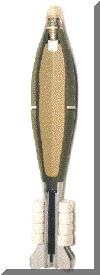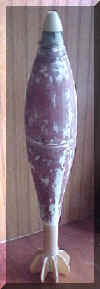×
We have recently moved to a new server. If you run into any issues, please let us know through the Contact Us link at the bottom of the page. Thanks for visiting RocketReviews.
| Manufacturer: | Scratch |
(Contributed - by Drake "Doc" Damerau )
 |
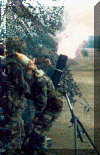 |
 |
| Why A 120mm Mortar? |
| I work at Chamberlain Manufacturing, the operating contractor of the Scranton Army Ammunition Plant as the Plant Metallurgist and Laboratory Director. We make several products one of which is the 120mm mortar family. I wanted to make a 120mm mortar as my Descon entry to show rmr what I do for a living and to show the guys at work what my hobby is. This is an exact scale model! I checked the completed model using product gauges and most of the datum's are out. OK, so it's not exact but it closer than most models. Most of the dimensions that are out are only out by a few thousandth's. Sorry Kenny, this ones not close enough for government work. |
The Model
| The mold | |
| I made a mold from an actual mortar. (No, it wasn't loaded) The one you see pictured is the exact same mortar as the high explosive mortar but is inertly loaded for training purposes and thus painted blue (FRTR). I first covered the mortar assembly with Vaseline then I laid papier-mâché onto a mortar in several layers. The finished thickness was about 1/4 inch. The hardest part was accurately applying the papier-mâché to the obturating grove (OBT groove). (The undercut in the bourlet, just aft of the ojive) I laid thin strips in the grove to bring it to the OD level. After three days of drying time I cut the papier-mâché lengthwise on each side. It was a little difficult to pry apart but caved in to my prodding in short order. | |
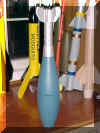 FRTR |
 Covered in papier-mâché |
 The molds |
 Fin and Boom |
 OBT Groove Mold |
| Glassing | |||
  The papier-mâché was covered with a
light coating of Vaseline to facilitate removal of the fiberglass. I coated the
molds with West Systems epoxy and laid 4 layers of 6 oz glass. Again, the
difficult part was the OBT grove. Once dry, I cut the glass so that it was even
with the sides of the molds. The glass popped right out, right? OY! Not a
chance. A good portion of it did but I ended up soaking them in one of the
bathtubs for two days and picking off the news paper! (My wife is still pissed)
OK, the paper is off and the two halves are sanded. I expoied them together and
glassed them. The glass didn't sit smoothly and evenly in the molds so I had a
lot of exterior cosmetic work to do. I sanded and glassed for two weeks! The papier-mâché was covered with a
light coating of Vaseline to facilitate removal of the fiberglass. I coated the
molds with West Systems epoxy and laid 4 layers of 6 oz glass. Again, the
difficult part was the OBT grove. Once dry, I cut the glass so that it was even
with the sides of the molds. The glass popped right out, right? OY! Not a
chance. A good portion of it did but I ended up soaking them in one of the
bathtubs for two days and picking off the news paper! (My wife is still pissed)
OK, the paper is off and the two halves are sanded. I expoied them together and
glassed them. The glass didn't sit smoothly and evenly in the molds so I had a
lot of exterior cosmetic work to do. I sanded and glassed for two weeks! |
|||
| Fin and Boom Assembly | |||
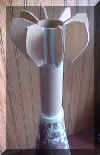 The tube and fin section is
called the "fin and boom assembly" It contains the explosive
charge to propel the mortar. In this case, its a 38mm motor mount tube (mmt).
Can you believe that an LOC 38mm tube is only 0.028" smaller than a real
tube!!! Just enough to take some thin glass and make it perfect. I laid glass
in the ID on the forward and aft ends to size it down to fit the mmt. The 38mm
mmt slid in the assembly very nicely. Once in, I epoxyied the mmt in place and
sanded the forward flat and square. The fins (all 8 of them) were made using
1/8" thick aircraft ply. They are slightly thicker than the real ones. No
room for glass here. I took the real fin and boom assembly and traced the fins
on the fin material. I cut them slightly larger than the tracing and sanded
them to the proper dimensions. The placement was easy using the WRASP fin guide
cut out. The tube and fin section is
called the "fin and boom assembly" It contains the explosive
charge to propel the mortar. In this case, its a 38mm motor mount tube (mmt).
Can you believe that an LOC 38mm tube is only 0.028" smaller than a real
tube!!! Just enough to take some thin glass and make it perfect. I laid glass
in the ID on the forward and aft ends to size it down to fit the mmt. The 38mm
mmt slid in the assembly very nicely. Once in, I epoxyied the mmt in place and
sanded the forward flat and square. The fins (all 8 of them) were made using
1/8" thick aircraft ply. They are slightly thicker than the real ones. No
room for glass here. I took the real fin and boom assembly and traced the fins
on the fin material. I cut them slightly larger than the tracing and sanded
them to the proper dimensions. The placement was easy using the WRASP fin guide
cut out. |
|||
| Fuse |
 This was the most difficult part of the project. I modeled the
fuse after a real M734 fuse. (Yes the fuse was inert too) I took a block of
balsa wood and drilled a hole to put a piece of all-thread about 2" in. I
then commenced to do the drill-lathe thing. I mounted the all-thread in my
handy-dandy high speed drill and put the drill in my vise. I didn't get
it done for the picture you see below. The fuse shown is the real fuse. This was the most difficult part of the project. I modeled the
fuse after a real M734 fuse. (Yes the fuse was inert too) I took a block of
balsa wood and drilled a hole to put a piece of all-thread about 2" in. I
then commenced to do the drill-lathe thing. I mounted the all-thread in my
handy-dandy high speed drill and put the drill in my vise. I didn't get
it done for the picture you see below. The fuse shown is the real fuse. |
| Paint and other finishing touches |
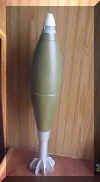 The mmt was a no brain'er because the boom is a 38mm
mmt. For the first launch I used a 29mm adaptor and secured 3/16" Kevlar®
rope to the forward end of the adaptor. The parachute is a 30" Aerotech.
I'm looking for a relatively fast decent at the high school. At a NEPRA launch
I will use a little larger chute and a I161. Painting was a non event. I
painted the fin and boom assembly then masked it off after it dried and painted
the body. Again, the fuse on top is a real fuse. No time to finish the copy.
Final dry weight after adding lead to the nose area is 41.6 oz, or 1,180 grams.
The diameter is 120mm and the overall height is `37.750" The mmt was a no brain'er because the boom is a 38mm
mmt. For the first launch I used a 29mm adaptor and secured 3/16" Kevlar®
rope to the forward end of the adaptor. The parachute is a 30" Aerotech.
I'm looking for a relatively fast decent at the high school. At a NEPRA launch
I will use a little larger chute and a I161. Painting was a non event. I
painted the fin and boom assembly then masked it off after it dried and painted
the body. Again, the fuse on top is a real fuse. No time to finish the copy.
Final dry weight after adding lead to the nose area is 41.6 oz, or 1,180 grams.
The diameter is 120mm and the overall height is `37.750" |
| OK cool, but does it fly? |
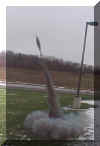 First flight went great. I used a G38-4fj. It left
the pad and went up in an arch to about 800 feet. I wanted to keep it low
because of winds and the small area. First flight went great. I used a G38-4fj. It left
the pad and went up in an arch to about 800 feet. I wanted to keep it low
because of winds and the small area. |
Sponsored Ads
 |
 |
